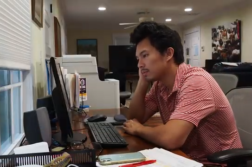SALT LAKE CITY, Utah (Ivanhoe Newswire) – Do you feel like a fraud? Is everyone else smarter, brighter, better? If you’re feeling this way, you’re not alone. In fact, 70 percent of people feel this way at one time or another. It’s called imposter syndrome, and these feelings of inferiority can impact you at work, school, and home.
“It’s very easy to look around and be like, I don’t, I don’t feel like I belong here. And it’s because I just see what I don’t have,” said Ethan Gwen, a BYU Graduate Student. “I just felt very inadequate and felt very lost and worried about the future,” said Chelsia Liu, a BYU Graduate Student. “I wasn’t supposed to be fitting in where I am,” said Matthew Johnson, a BYU Graduate Student. These college kids all have experienced imposter syndrome.
“They struggle to internalize their own success, they’re constantly worried about or concerned that other people are going to find out that they’re a fraud or a fake in the social group,” said Jeffrey Bednar, PhD, an Associate Professor of Management at Brigham Young University. He spearheaded research into imposter syndrome. A twitter poll found 87 percent of people said they had experienced it. “I feel it right now. I feel like everybody else knows so much more,” said Jason Stewart, a BYU Graduate Student.
In academia, most at risk, women in graduate programs, perfectionists and first-generation college students. Birth order and parenting styles can also play a role. Children who are praised for their grades instead of the process are more at risk. As for dealing with it, Bednar found many people binge to try to mask the feelings. “By engaging for hours and hours at a time and watching movies or doing other things that really didn’t help them contribute to their success,” said Bednar.
A more successful approach … “Having someone outside of your particular social group, where you’re feeling like an imposter who can help you to recalibrate your perspective,” said Bednar. And remember, you can still have imposter moments, but you don’t have to live an imposter life.
Another important step to overcoming imposter feelings—acknowledge your thoughts and put them into perspective. Professor Bednar says you can experience imposterism at any age, and at any stage of your life. To see if you may be suffering from it, there is an online test you can take at https://testyourself.psychtests.com/testid/3803
Sources:
https://time.com/5312483/how-to-deal-with-impostor-syndrome/
Contributor(s) to this news report include: Marsha Lewis, Producer; Rusty Reed, Videographer; Roque Correa, Editor.
To receive a free weekly email on Smart Living from Ivanhoe, sign up at: http://www.ivanhoe.com/ftk



